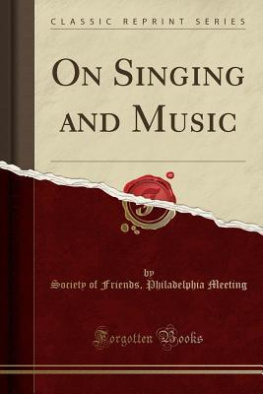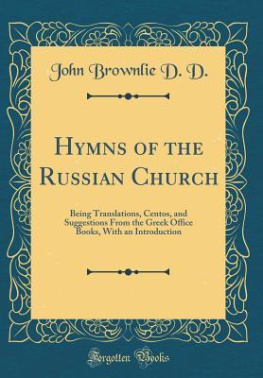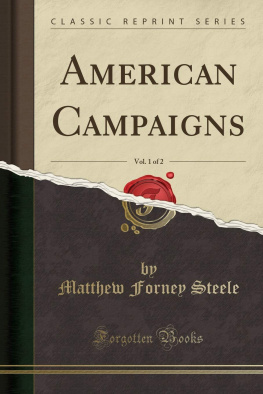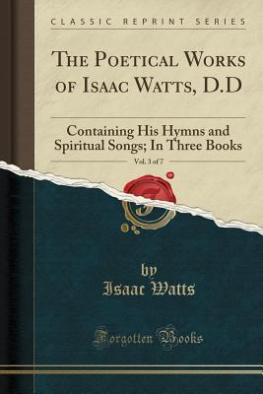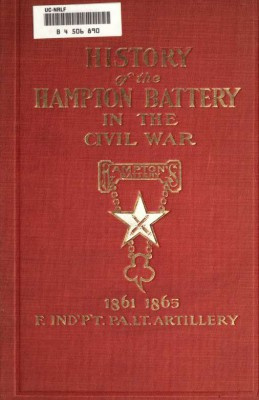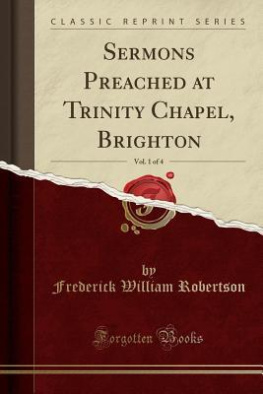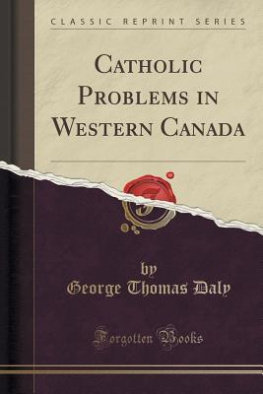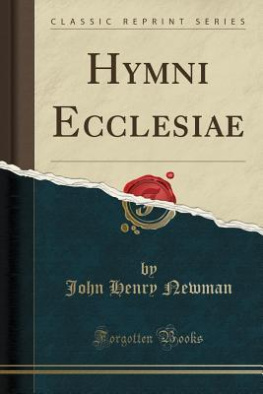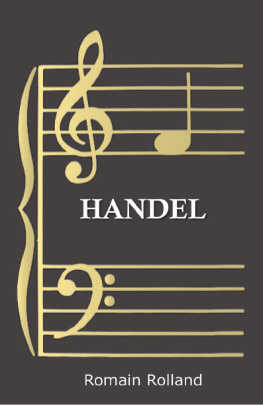ON
SINGING AND MUSIC.
TO BE HAD AT FRIENDS' BOOK STORE,
No. 304 Arch Street, Philadelphia.
1885.
At a Yearly Meeting of Friends held in Philadelphia from the 20th of the Fourth Month to the 24th of the same, inclusive, 1885.
An Essay on Singing and Music contained in the Minutes of the Meeting for Sufferings was now read, setting forth the spiritual nature of true worship, the danger of depending on outward forms in religious meetings, and the disadvantages connected with the practice of singing and music as an amusement. Much unity was expressed with the essay, and it was concluded that it should be published and distributed for information and warning to our own members and others. Desires were felt that in thus issuing a renewed testimony to the principles of our Society, we may be individually aroused to the necessity of so living in communion with the Father of Spirits, and in subjection to the revelations of his Light in our hearts, that our meetings may truly be held under the overshadowing of the Divine Power.
Taken from the Minutes.
Joseph Walton , Clerk.
On Singing and Music.
We have been brought under a feeling of religious concern that the ancient testimony of the Society of Friends to the true nature of spiritual worship may be fully maintained by all who claim that name; and that they may be watchful against the introduction of practices which will undermine the support of this testimony, and thus lead those who profess to be the children of the Light, back into a dependence upon forms, out of which their forefathers in the Truth were brought by that remarkable outpouring of grace and spiritual power which marked the rise of Friends as a distinct people.
The fundamental doctrine declared by our Saviour, when He said, It is the Spirit that quickeneth, the flesh profiteth nothing, was steadily kept in view by George Fox and his fellow laborers. They clearly saw that Christ had ended the Jewish law, with its outward and ceremonial observances, and had introduced a spiritual dispensation, under which He, by his heavenly and eternal Light or Spirit, was to be the Leader, Guide and Helper of his people; that all was now to be done in and by Him; and that this was especially true of religious worship, which depends upon the enlightening, quickening power of his Holy Spirit.
All confidence in the flesh,in the natural abilities of man,was removed; and they were taught to distinguish between that which is of man and that which is of God,between that stirring up of the natural feelings which can be produced by the skilful use of outward means, such as music, pictorial representations and architectural grace and grandeur; and that solemn covering of the heart which is a fruit and an evidence of the extension of Divine help and power.
Hence these divinely enlightened men and women laid aside the forms in which they had been educated, and which many of them had sincerely and zealously practised, and, in their private retirements before the Lord, and when they assembled for the performance of public worship, they sat in silence before Him, seeking to draw near in spirit, in living exercise of mind, that they might feel the arising of his power, and be enabled to offer acceptable worship.
As that power arose in any, and under its influence, they were led to utter words of prayer or praise to the Almighty, or exhortation to their fellow believers; they were comforted or edified in proportion as they could feel the Spirit bearing witness to the life that accompanied the vocal expressions. Thus their dependence was not placed on man, but on the Spirit that quickeneth.
There was no desire to limit the operation of the Spirit, or to lay down any rule which would prohibit in times of worship any act which truly proceeded from its motions; but there was a jealous care that none of these outward things should be done as formal matters; that people should not look upon them as essential to the holding of meetings for worship, and that they should not in any manner be led away from their dependence on the fresh extension of Divine life and light to their souls, as the very foundation of true worship. The writings of the early members of our Society abound in evidences of their watchful care in this respect.
Among them, one of the most earnest and effective laborers for the spread of the Gospel, was Edward Burrough, whose efforts in London were blessed to a large number. Over the converts in that city he watched with anxious love; and, when absent in the service of his Master in other parts, frequently visited them by epistles, in which he gave much sound and practical advice. From these epistles are taken the following passages, referring to the manner in which these meetings for worship were to be held.
We charge and command you in the presence of the Lord, whose power is dreadful, that you meet together in silence, and wait, and none to speak a word but what he is moved to speak, a word from the Lord.E. Burrough's Works, Ed. 1672, p. 70.
We charge by the Lord that none speak without eternal [Divine] motion; for if you do, the false prophet speaks, and his words eat as a canker, and darken and vail them that hearken to it.Id., p. 71.
The nature of this spiritual worship is clearly portrayed by Robert Barclay; see the 11th Proposition of his Apology, particularly in Sections 6 and 7, to which we desire the reader to refer.
We have viewed with much concern the gradual creeping into the meetings of Friends, in some parts of the country, of latter years, of reading the Scriptures, and of singing, practices which, until within a few years, were almost unknown amongst us.
We believe that these changes are an evidence of a departure from that dependence on the Lord for ability to worship Him aright, which was so conspicuous a testimony of this Society; and that they are connected with a shrinking from patient waiting upon the Lord, and from the humbling exercise of mind which is often felt in endeavoring to draw near in spirit to Him.
Friends do not assemble in their meetings for Divine worship for the sake of listening to any outward performances. If this principle is once departed from, there is no tenable ground to prevent a gradual lapse into a full adoption of those forms out of which our Society was brought in the beginning. If the Scriptures are to be read in our meetings, how easy is it to conclude that a careful selection, such as is provided in the liturgies of some religious bodies, would be preferable to the choice likely to be made by persons of less education, or who have given less time and thought to the subject. If singing by tune is to be practised, why should not the highest style of art, aided by musical instruments, be made use of, so as more effectively to stimulate the emotions of the listeners? If preaching is essential to the proper holding of a meeting, it may be asked, would it not be better to employ persons of marked ability, who have been regularly trained to such an employment, and who may reasonably be supposed to be better prepared than others to interest and instruct an audience? If vocal prayer is always in place, without regard to the immediate promptings of Him who only knows the conditions and needs of those assembled, it might be asked, why not use some of those beautiful and comprehensive forms which are found in the prayer-books of other societies?

